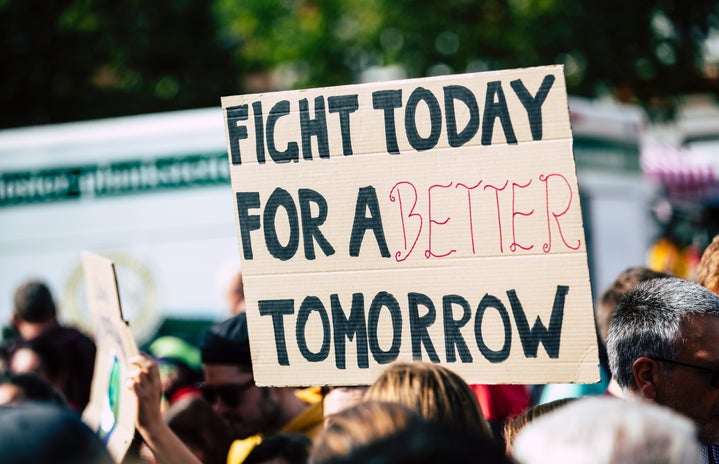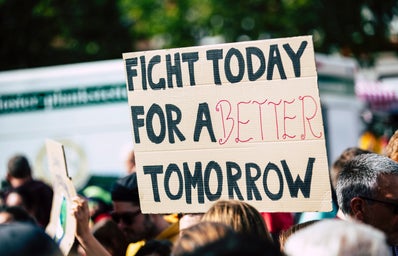At the beginning of March 2024, I was fortunate enough to fly out to Austin, TX for the first portion of my fellowship with a gun violence prevention organization called Giffords. This fellowship entails two fly-ins (one in Austin and the other in Washington D.C.) with lobbying and advocacy training, as well as a community development project. My trip to Austin was truly a once in a lifetime experience, and I met so many inspiring individuals. While I still have to complete my community development project and the second portion of my training, I have already learned so much in this fellowship and am eager to share as much as I can along the way!
On the first night of the fellowship, we learned about the woman behind Giffords: former congresswoman Gabby Giffords. Giffords was a phenomenal representative for her constituents in Tucson, AZ, and her career took off almost immediately. She was a profound speaker in Congress and always poured her heart into her community. But tragedy struck when Giffords and 18 others were shot in Tucson, AZ at a constituent event in a Safeway parking lot. Six of these victims were killed. Giffords survived, but her road to recovery was not easy and continues to this day. After she was shot, she developed aphasia, a speaking impairment that makes her unable to speak fluently and is partly paralyzed. Because of these traumatic injuries, Giffords had to step down from her position in Congress. But stepping down from Congress wasn’t the end of her trailblazing career. After the shooting in Sandy Hook in 2012, Giffords decided to dedicate her life to preventing gun violence in America and founded Giffords, a gun violence prevention organization that advocates for common sense gun legislation such as universal background checks, safe storage, extreme risk protection orders, and more. The work Giffords has done is truly inspiring, and her story deeply resonated with both myself and all of the other fellows. After learning about Gabby, we were eager to see how we could support her work through the Giffords organization as Courage Fellows.
The statistics may not be what you expect
One of the biggest takeaways from the first round of training is the misconceptions we have about gun violence. In our introduction to gun violence prevention presentation, we took a look at the research done by the Giffords Law Center, learning that around 43,000 Americans die from guns each year. Of these deaths, 57% are suicides, 39% are homicides, 1.2% are unintentional shootings, and 1.3% are police shootings. The statistic that fascinated me the most was the fact that of the 39% of homicides, less than 5% are mass shootings. When we think about gun violence in America, the first thing that comes to mind for many of us is the mass shootings that seem to happen daily. And while these mass shootings are horrific, when you learn that they make up such a small percentage of gun deaths, it puts into perspective the tens of thousands of stories that go unheard, such as gun violence in marginalized communities. Black men make up 52% of gun homicides, and unarmed black civilians are five times more likely to be shot by the police than unarmed white civilians.
This just goes to show how critical it is to invest resources into community violence intervention initiatives, as well as common sense gun legislation that could directly impact not only mass shootings, but the astounding rates of violence that don’t get media attention. Think about how many suicides and gun homicides could be prevented if background checks were instated, or how many lives would be saved if firearms could be taken out of the hands of abusers under the extreme risk protection order law. While the numbers above are hard to see, knowing that these deaths are completely preventable gives me hope, hence why I am so invested in the movement to end gun violence.
Find your definition of success
Although the laws that are proven to reduce the sickening rates of gun violence are proven to be effective, many states across the United States are only going backward. Whether it’s allowing people to purchase a gun without a permit, not enacting background checks or safe storage laws, allowing high capacity ammunition or assault weapons, repealing gun violence prevention legislation, or failing to enact extreme protection orders, many states are failing their residents with these careless laws that only benefit the gun industry. Although most Americans support the common sense measures stated, the government is too caught up in politics to listen. This causes a lot of frustration for activists like myself.
However, I live in Michigan, and our state government recently adopted more preventative measures on Feb. 13, 2024, such as safe storage, extreme risk protection orders, background checks, and not allowing those convicted of domestic violence to possess firearms. Passing these laws was a victory that took years, and the pride I had in my state when they were enacted is unmatched. But others in the fellowship cannot say the same, as a handful of the Courage Fellows come from Texas, Arizona, Florida, and other states known for having very loose gun laws. It can be exhausting to keep pushing forward in the movement towards a country without gun violence, especially in states that refuse to listen and only regress in progress. While talking to my peers in the fellowship, I realized how polarizing the political climate is.
The most meaningful piece of advice I took away from my experience in Austin came from gun violence prevention activists Nicole Golden, Roger Garza, and Eric Diaz, who fearlessly advocate for gun control in Texas. I asked them how they maintain their momentum in a state that hasn’t listened to their calls to action, and Golden responded that “success is up to your own definition.” Although Texas is one of the most relaxed states in the nation when it comes to gun laws, the three of them have mobilized thousands of individuals to vote and rally for gun control, and have made vast progress in communities experiencing violence. This in and of itself is a success, and it’s important to remember that although legislation hasn’t been passed, progress has still been made, and it’s essential to never let anyone tell you that your work “doesn’t matter” or hasn’t impacted anyone. The three of them agreed that this is an uphill battle that will take years, but recognizing the small wins along the way is what keeps them going.
There’s a ton of BS
This may not be a surprise to anyone, but there’s a lot of BS legislation that protects the gun industry. An important one I wanted to mention is the Protection of Lawful Commerce in Arms Act (PLCAA). This law protects the gun industry from being held liable for any crimes that occur with their products. PLCAA has ruined lives. The Courage Fellows were fortunate to have Sandy Phillips and Lonnie Phillips, the founders of Survivors Empowered, share their stories. Their daughter, Jessi Ghawi, was among the 12 victims who were fatally shot in Aurora, CO in 2012 at a movie theater. The Phillips family later found out that the tens of thousands of ammunition rounds used in this shooting were purchased online from a seller who didn’t even verify the age of the perpetrator. But they couldn’t pursue legal action because of PLCAA, and this ammunition seller is in business to this day. This story not only upset me but called me to action in joining the efforts to repeal PLCAA and hold the industry accountable.
Overall, this was an incredibly inspiring trip. I met so many young activists from around the country that I can now call my friends, as well as so many knowledgeable and inspiring presenters. I am beyond excited to continue my training and lobby for gun violence in Washington D.C. in June, and to develop a community engagement project. Gun laws truly save lives, and I am empowered to keep pursuing a future in which gun violence does not exist.


